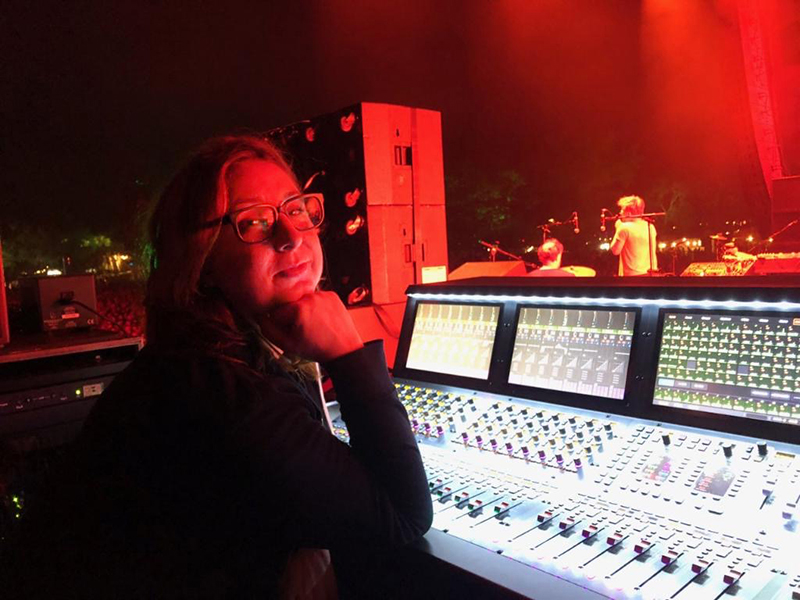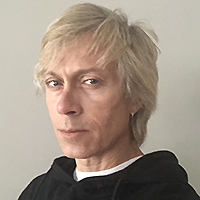In early March, Christina Moon’s work schedule cleared completely owing to the pandemic. “I’d just gotten home from a European run with Sleater-Kinney and was scheduled to leave March 13th for dates with Mandy Moore. I actually remember wishing I had a bit more time at home. I guess the lesson is, be careful what you wish for.”
The Seattle-based audio engineer notes that she’s dealing with the impact, professionally and personally, by adding to her knowledge of audio and staying virtually connected and engaged with her various “tour families.” Although it’s not the same as being in the same room, it’s still festive: “I actually talk to people more now than I ever would. There’s always some touring group getting together.” And while the party is virtual, the hangovers aren’t. “The Zoom happy hours are killing me,” she adds, laughing.
Being at home for an extended period of time is a rarity for Moon, who typically spends anywhere from eight to 11 months a year on the road. “I had been trying to keep it a little less than that; just to make my life not all about the road, but I love touring and travelling, and I worked so hard to get where I’m at.”
Regardless of how the pandemic plays out, it prompted many people to re-assess the importance of things that never seemed all that integral previously – like the daily face-to-face interactions many take for granted, the little indulgences and going places. “I would kill for a 5 o’clock martini right now, but that’s not going to happen,” Moon says. “It’s crazy what you take for granted, but right now I just want to get back to work.”
The CARE act, MusiCares and other avenues of support are helpful, she notes, adding “But I try not to think too far into the future because it would just be overwhelming. And now it’s looking like tours may not start up until next year, which is really hard to wrap my head around.”
If there is a positive side to this, it’s seeing the audio and musical community come together to support each other. “At first there was a lot of commiserating about the situation. And that was needed, in the beginning, that emotional support, but now it seems like it’s turning towards educating ourselves because we have the time. I’m trying to get more comfortable with consoles I’m not as familiar with so that I can be ready to say yes to anything when this is over.”
Developing The Skills
Although Moon has spent a significant time at front of house over her two decades in the business, she’s come to be known as a go-to monitor engineer with abiding patience, unswerving focus, and the ability to troubleshoot while keeping her artists comfortable so they can perform at their best. Those are skills she developed early on while working the 1990s Seattle club scene, and they’re skills she’s added to substantially since on extensive tours with artists including the Yeah Yeah Yeahs, Death Cab for Cutie, LCD Soundsystem, and others.
As for what prompted the switch to monitors: “It was the jobs I was offered, but I was happy doing monitors the first time I toured (with the Yeah Yeah Yeahs). They were always so sweet when they were trying to get comfortable with the sound on stage, but there were times when they’d say, ‘It’s fine,’ and, from their body language, it certainly didn’t look fine. When I got what they wanted, just watching everything change was amazing. I really enjoy being part of that process of figuring it out how to make it better for the artist.”
Generally speaking, in doing so, Moon keeps things simple. “I don’t use a lot of plugins. When you have all of this ‘gear’ at your fingertips it’s tempting to use it all, but I think people need to hear what they actually sound like. You’re actually doing a service for the FOH person if you can get musicians to correct (sonic) problems on stage.”
In cases where she’s parachuted into a gig where there have been previous issues with the monitor mix, Moon often finds a solution by simplifying the mix. “I’ll see so many plugins turned on, compressing and altering everything, gating all the drums. Sometimes I’m asked, ‘What did you do? That sounds so good.’ And I answer, well, it’s what you sound like.”
Music has always been a passion, she says, particularly heavy rock. “One Christmas my dad got me a boom box, took me to Tower Records, and said ‘Pick out any tape you want.” I happened to pick up Def Leppard’s High ‘n’ Dry. That genre of music just spoke to me. And when the Seattle scene started, I had access to local shows and bands like Bikini Kill, The Melvins, and Mudhoney, which had a huge impact.”
Some of her long-time clients, Death Cab for Cutie and LCD Soundsystem for example, are artists whose knowledge of audio is expansive. Early on, however, like Moon, the bands she worked with in the clubs were just starting out. Those experiences had a lasting impact on her approach to audio going forward, and she’s grateful for them. “There’s something (valuable) about being thrown in the fire like that. You’re the only engineer. You’re on your own and you’ve got three or four bands every night to deal with and you’re typically mixing monitors from front of house so it can be a very stressful space to be in,” Moon says, “but you develop the skills to triage everything and see the big picture.

“It’s easy to get overwhelmed if someone’s unhappy with the sound on stage,” she continues, but even when it’s not clear exactly what an artist wants: “You need to be able to take a breath, think about what’s being asking of you and how to achieve that.”
That’s enabled her to deal effectively with potential catastrophes, remain calm and inspire confidence in her artists. The latter, she continues, was part of the attraction of mixing the stage: “The first time I noticed someone playing differently – having a great show because I understood what they were trying to convey to me – I realized the impact I could have on someone’s experience on stage.
“It’s about figuring people out,” she adds, and, in some cases, determining their needs by simply by observation and elimination; even when she hasn’t worked with a given artist previously. “By body language alone, you can see if you’re moving in the right direction.”















